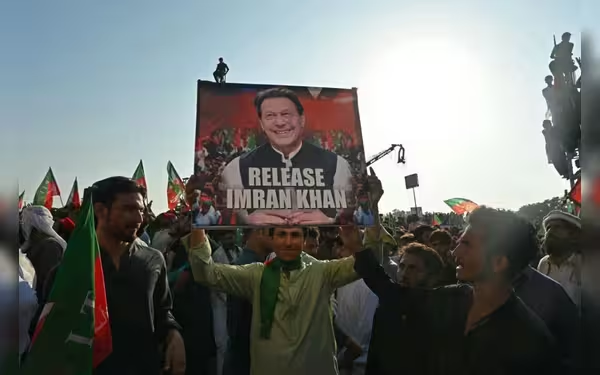Saturday, November 16, 2024 05:48 PM
Bail Granted to Ten PTI MPs Linked to Imran Khan in Pakistan
- Ten PTI lawmakers granted bail amid political tensions.
- Bail set at 30,000 rupees following anti-terrorism charges.
- Khan's influence remains strong despite government efforts.
 Image Credits: arabnewspk
Image Credits: arabnewspkAn anti-terrorism court in Pakistan grants bail to ten PTI lawmakers linked to Imran Khan, highlighting ongoing political tensions.
In a significant development in Pakistan's political landscape, an anti-terrorism court has granted bail to ten lawmakers from the Pakistan Tehreek-e-Insaf (PTI) party, which is led by the jailed former Prime Minister Imran Khan. This decision comes amidst a backdrop of heightened tensions and political strife following Khan's imprisonment in August last year. The court's ruling, witnessed by an AFP journalist, allows these lawmakers to be released on bail set at 30,000 rupees (approximately $100).
The ten MPs were among at least thirty individuals from Khan's party who were taken into custody after leading a major rally in Islamabad. This rally was part of PTI's ongoing efforts to challenge the government's actions, which they claim are politically motivated. The lawmakers faced charges under a new protest law and the anti-terrorism act, specifically for allegedly violating the Peaceful Assembly and Public Order Act, which was enacted just days before the rally.
Rights groups have criticized this law, arguing that it is an attempt to suppress freedom of expression and peaceful protest. The PTI has been at odds with the military since Khan's ousting two years ago, a conflict that escalated after his first arrest on corruption charges in May 2023. Following this arrest, Khan's supporters engaged in violent protests, leading to a significant crackdown on PTI by the military, which is known as Pakistan's most powerful institution.
Despite the government's efforts to diminish Khan's influence, his popularity remains strong. In the 2024 elections, candidates supported by Khan secured the most seats, although these elections were marred by allegations of widespread rigging. Analysts note that Khan's rise to power in 2018 was facilitated by the military, but his relationship with the generals soured, leading to his removal in 2022.
Recently, a United Nations panel of experts concluded that Khan's detention lacked legal justification and seemed aimed at preventing him from participating in politics. Additionally, several of his previous convictions have been overturned by the courts, further complicating the political situation.
As the political drama unfolds, it is clear that the struggle between the PTI and the military will continue to shape Pakistan's future. The recent bail granted to the ten MPs may be a small victory for Khan's party, but it also highlights the ongoing challenges faced by political figures in a landscape fraught with legal and political hurdles. The situation remains fluid, and the implications of these developments will be closely watched by both supporters and critics of the current regime.













